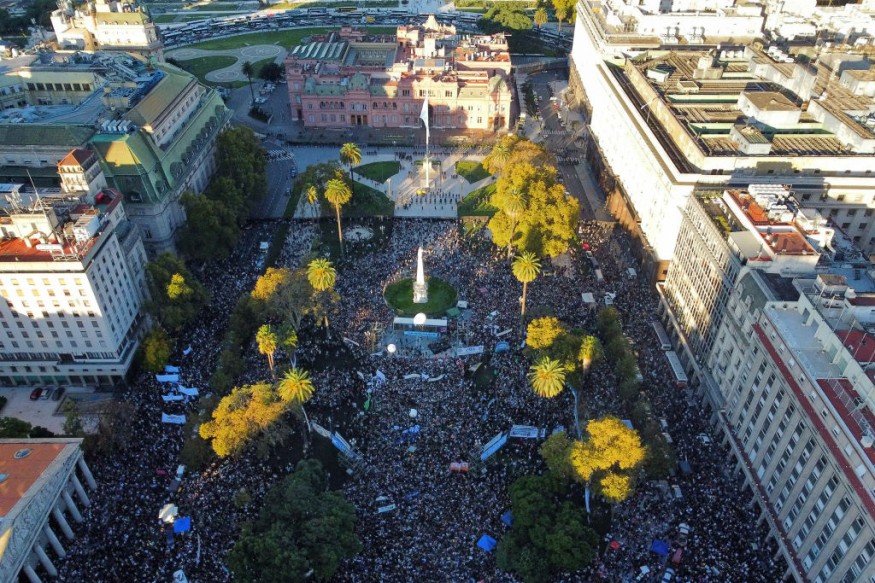Argentina President Javier Milei Faces Massive Protest Over Education Budget Cuts

More than a hundred thousand protesters poured onto the streets of Buenos Aires and other Argentina cities on Tuesday, demanding increased funding for public universities under President Javier Milei's administration.
The demonstrators, comprising students, alumni, unions, and political parties, marked one of the largest displays of public dissent since Milei's ascent to power on a platform advocating significant cuts to public spending and economic deregulation, CNN reports.
The University of Buenos Aires (UBA) reported a staggering turnout of around 800,000 participants in Buenos Aires alone, contrasting sharply with the government's estimate of 150,000 protesters, as relayed by local media.
The stark disparity in figures underscores the deep-seated divisions surrounding the issue of education funding in Argentina.
Javier Milei's government has drawn criticism for its decision to freeze the 2023 budget for public universities, opting only for increases in operational expenses, which represent a mere fraction of the institutions' overall funding requirements.
Protesters argue that such a freeze effectively amounts to budget cuts, particularly egregious amid Argentina's persistently high inflation rates, which have remained in double digits for the past three months.
Reflecting the sentiments of many demonstrators, one protester emphasized the fundamental nature of education, likening it to primary and secondary schooling and asserting it as a universal right deserving of protection.
READ NEXT : Argentina's Milei Eyes NATO Membership
Argentina Universities Grapple with Financial Crisis
The scale of the protests in Argentina underscores the growing unrest among students, faculty, and broader society in response to Milei's policies.
Public universities, such as the UBA, find themselves in dire financial straits, with budgetary constraints leading to operational challenges and, in extreme cases, existential threats, according to AP News.
At UBA, the effects of financial strain are palpable, with reports of power outages, malfunctioning facilities, and strained resources.
The university, renowned for its intellectual legacy, faces the grim prospect of closure, leaving hundreds of thousands of students in limbo and jeopardizing a legacy that spans Nobel laureates and presidential alumni.
Milei's administration committed to achieving fiscal equilibrium and has pursued austerity measures across various sectors, including significant cuts to public spending and subsidies.
Despite touting recent fiscal successes, the government's approach has stoked public outrage and sparked a heated debate over prioritizing economic stability versus social welfare.
As the crisis deepens, stakeholders within the university community and beyond call for urgent intervention to safeguard education and support educators grappling with plummeting incomes and eroding job security.
Milei's Economic Strategy Faces Opposition
Javier Milei's implementation of austerity measures, characterized by sweeping budget cuts symbolized by the metaphorical "chainsaw," has elicited mixed reactions.
While heralded as a necessary step towards fiscal responsibility, the measures have elicited fierce opposition, particularly from those directly impacted by the resultant austerity, Reuters noted.
Advocates for public education contend that it serves as a vital tool for social mobility and equity, providing individuals from diverse backgrounds with access to opportunities for personal growth and societal contribution.
In response to mounting criticism, the government has defended its stance on education funding, emphasizing the need for responsible fiscal management while urging for peaceful dialogue to address grievances.
As tensions escalate and the standoff between the government and protesters persists, the imperative for swift and equitable solutions to the education funding crisis becomes increasingly pronounced.
Argentina finds itself at a crossroads, with competing visions of economic stability and social welfare colliding on the streets of its cities.
The Argentina protests over education funding symbolize not only a struggle for the future of public universities but also a broader debate over the nation's priorities and values.
As stakeholders grapple with these complex issues, the path forward remains uncertain, underscored by the urgency of addressing the immediate needs of the education sector while charting a sustainable course for Argentina's future.
READ MORE : Haiti's Health System on Brink Amid Crisis
This article is owned by Latin Post.
Written by: Ross Key
WATCH: Protesters march against Argentina's education cuts - From REUTERS
Subscribe to Latin Post!
Sign up for our free newsletter for the Latest coverage!

















